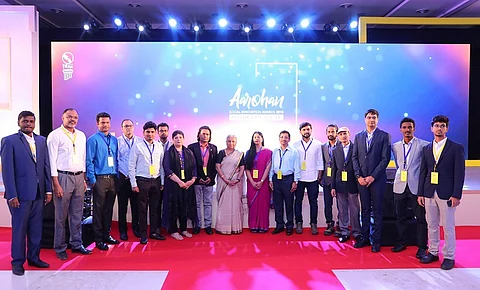

Infosys Foundation, the philanthropy and charity wing of Infosys, hosted an awards ceremony on Wednesday for “social innovations” in their Bengaluru campus. According to Infosys, these are products which provide “innovative solutions to support the underprivileged”.
The gold awardees, who were given a cash prize of Rs 20 lakh, and an 8-week mentorship program with professors at IIM-Hyderabad, were awarded to innovators in disease detection.
Partha Pratim Das Mahapatra from Calcutta was awarded for his handheld non-invasive detector of anaemia and predictor of lung and liver problems; Dr Binita Tunga and Rashbehari Tunga from Bengaluru for their infection detector of dengue, malaria and chikungunya and its co-infections on the first day of infection which gives results within ten minutes; and finally to Foundation for Tuberculosis, Malnutrition and AIDS (TUMAAS) from Mumbai for their early detection kit of TB infections through urine, which gives results in 5 minutes.
The other gold awardees were Ramalingam PS for his affordable standing-sitting wheelchair invention for those recovering from spinal cord injuries, and Rashid K, Vimal Govind MK and Nikhil NP from Kerala for ‘Bandicoot’, a robot which replaces human intervention in cleaning manholes.
Chairperson of Infosys Foundation Sudha Murthy said, “I usually don’t make political statements, but the state should support such important innovations. We can only do so much when supporting these innovations. Cleaning our drains is a very important and basic problem to solve. So many underprivileged people are going into it and not coming back out alive, and it is inhumane to allow it to continue.”
The silver awardees, who were given a cash prize of Rs 10 lakh, were Nitesh Kumar Jangir from Bengaluru for his innovation of a neo-natal breathing support system without electricity; Anish Karma from New Delhi for his knee-ankle foot brace innovation for people with disability, which allows people to cycle and squat. Rajlakshmi Borthakur from Bengaluru was also awarded for her wearable epilepsy detector made at low cost; Dr Vishal US Rao from Bengaluru for his 'voice prosthesis' speaking devices for throat cancer patients, many of whom haven't spoken in 10-15 years; and to Rohit Patel from Madhya Pradesh for his low-cost solution for onion storage for up to 15 months.
The competition saw entries from across the country, and the jury had a tough time to go through all the 1700 applications. The jury consisted of Arvind Gupta, Indian toy inventor and science expert, Anil Gupta, faculty of IIM Ahmedabad, Trilochan Sastry, former Dean of IIM Bengaluru, GVV Sharma, Faculty of IIT Hyderabad, Sumit Virmani, Chief Marketing Officer, and Sudha Murthy, the Chairperson of Infosys Foundation.
Nandan Nilekani, Chairman of Infosys said that they chose the products which they thought could be scaled up. “Innovations best happen when there are a lot of constraints. The constraint here is whether it can be done at a low cost, and whether it can be scaled up in production, so that it can have maximum impact. The scale should be built into the thought of the project, and frugal innovation is the essence of that,” he said.
When asked to comment on the ongoing protests against Citizenship Amendment Act and the National Register of Citizens, Sudha Murthy declined to comment.